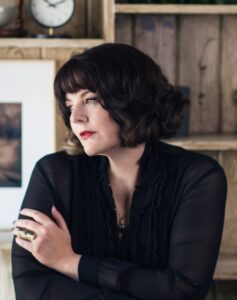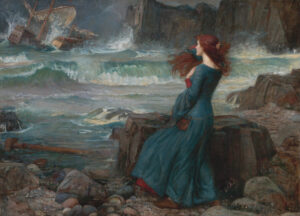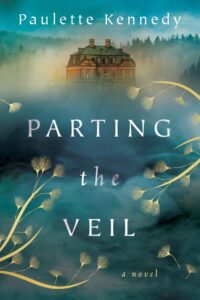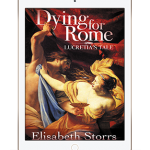 My guest this month is Paulette Kennedy, author of Parting the Veil, her debut novel. Originally from the Missouri Ozarks, Paulette now lives with her family and their menagerie of pets in a quiet suburb of Los Angeles. In her free time, she enjoys tending to her garden, knitting, and finding unique vintage treasures at thrift stores and flea markets.
My guest this month is Paulette Kennedy, author of Parting the Veil, her debut novel. Originally from the Missouri Ozarks, Paulette now lives with her family and their menagerie of pets in a quiet suburb of Los Angeles. In her free time, she enjoys tending to her garden, knitting, and finding unique vintage treasures at thrift stores and flea markets.
As a history lover, she can get lost for days in her research—learning everything she can about the places in her stories and what her characters might have experienced in the past. This dedication to research infuses her world-building with realistic detail, and creates a cinematic, immersive experience for the reader.
You can connect with Paulette Kennedy via her website, Facebook, Twitter, Instagram, TikTok and Goodreads.
The Parting Veil is available on Amazon, Barnes & Noble and Indie Bound.
What or who inspired you to first write? Which authors have influenced you?
My mom was always reading when I was a child and I picked up my love of books from her. After that, it was my teachers. I had several who mentioned that I had an aptitude for writing, although I didn’t actively pursue writing novels until after high school. I have so many authors who are influential/inspirational to me. I’d say Daphne Du Maurier would be my most prominent idol, but I also love to read Philippa Gregory, Kristin Hannah, and Kate Morton. The way in which they write makes historical fiction accessible and engaging to readers who might not otherwise pick up a historical novel.
What is the inspiration for your current book? Is there a particular theme you wished to explore?
There were many inspirations for Parting The Veil, but mostly I wrote it as an homage to the classic gothic romances I read as a girl with a modern, feminist twist that I hope readers will enjoy. The plot itself was partially inspired by the real-life stories of Gilded Age American heiresses who journeyed to England to marry into the aristocracy. Some of their new husbands lived in a state of genteel poverty, in crumbling mansions with mismanaged estates that had been suffering due to the longstanding agricultural depression in Great Britain. All of that was perfect fodder for a gothic novel. I would say grief and forgiveness are the central themes.
What period of history particularly inspires or interests you? Why?
I’m interested in so many time periods, but the late Victorian into the Edwardian era is of special interest to me because of the massive social and political changes. You had the rise of the middle class, due in part to the Industrial Revolution, socialism, women’s suffrage, etc. There are so many echoes to our modern era, and that’s why I chose to set Parting The Veil on the cusp of the 20th century.
What resources do you use to research your book? How long did it take to finish the novel?
I’ve been working on the novel off and on for over two years–almost three–and during that time I did extensive research, although I’ll always wonder if I did enough! Research is both the blessing and the curse of the historical fiction author. In writing this novel, I had to research day-to-day life in the Victorian era, the Great Boer War, medical and scientific advancements, and the flora and fauna of the location I was writing in. I consulted several books (which are listed in my Author’s Note) as well as online sources and expert readers to help shore up my research. The one regret I have was that I was unable to travel to Hampshire to do on-location research due to the global pandemic. Still, I had friends from the UK who helped to fact-check me and read the novel for cultural discrepancies. I’m very grateful to my expert readers and sensitivity readers for their help.

Miranda – The tempest
*signed b.r.: J.W. Waterhouse / 1916
Is there a particular photo or piece of art that strikes a chord with you? Why?
I’ve always loved Miranda (The Tempest) by John William Waterhouse, because of the emotion and movement conveyed in that painting. The romantic part of me loves the entire Pre-Raphaelite aesthetic, although I also love Gustav Klimt’s work as well.
What do you do if stuck for a word or a phrase?
I usually take a break to read or go for a walk to help clear my mind from the mental clutter that often happens when I’m drafting or revising.
Is there anything unusual or even quirky that you would like to share about your writing?
I tend to keep to a schedule for accountability reasons, which is kind of boring, but it works! The quirkiest thing I can think of is that sometimes my ideas come to me in dreams. I once had a dream about a half-ruined gothic mansion, and that dream served as the inspiration for the manor house in Parting The Veil.
Do you use a program like Scrivener to create your novel?
I use Word to draft, but I love my journals for scribbling down ideas and for brainstorming.
What advice would you give an aspiring author?
To read widely and not take yourself too seriously. This business is full of hard-knocks–from rejections from agents to harsh criticism from readers and reviewers. The more you can separate your sense of self from how your work is perceived, the better your mental health will be. Focus on what you can control–growing your writing craft and learning something new with each manuscript–and try to let the rest go. Easier said than done, I know.
Tell us about your next book.
My current work-in-progress is based in the Ozarks–where I’m from–and it centers a family of hereditary hedge witches/granny women along two timelines fifty years apart. It’s my love letter to “home.”

When Eliza Sullivan inherits an estate from a recently deceased aunt, she leaves behind a grievous and guilt-ridden past in New Orleans for rural England and a fresh start. Eliza arrives at her new home and finds herself falling for the mysterious lord of Havenwood, Malcolm Winfield. Despite the sinister rumors that surround him, Eliza is drawn to his melancholy charm and his crumbling, once-beautiful mansion. With enough love, she thinks, both man and manor could be repaired.
Not long into their marriage, Eliza fears that she should have listened to the locals. There’s something terribly wrong at Havenwood Manor: Forbidden rooms. Ghostly whispers in the shadows. Strangely guarded servants. And Malcolm’s threatening moods, as changeable as night and day.
As Eliza delves deeper into Malcolm’s troubling history, the dark secrets she unearths gain a frightening power. Has she married a man or a monster? For Eliza, uncovering the truth will either save her or destroy her.
Congratulations on giving birth to your first book baby, Paulette! All very exciting. I love the cover!
 Haven’t subscribed yet to enter into giveaways from my guests? You’re not too late for the chance to win this month’s book if you subscribe to my Inspiration newsletter for giveaways and insights into history – both trivia and the serious stuff! In appreciation for subscribing, I’m offering an 80 page free short story Dying for Rome -Lucretia’s Tale.
Haven’t subscribed yet to enter into giveaways from my guests? You’re not too late for the chance to win this month’s book if you subscribe to my Inspiration newsletter for giveaways and insights into history – both trivia and the serious stuff! In appreciation for subscribing, I’m offering an 80 page free short story Dying for Rome -Lucretia’s Tale.



I’m always interested in the author’s inspiration and I love author’s notes at the end of a book (but I read footnotes).
Sounds like a very good read! I also like victorian era and love finding vintage treasures as well :)
What a wonderful interview! It’s always so nice to find a new author and I have found many through author interviews. This was an interesting interview Elizabeth and I look forward to reading Paulette’s “Parting The Veil”. Thank you so much.
This sounds like a most impelling read. I’m looking forward to it.